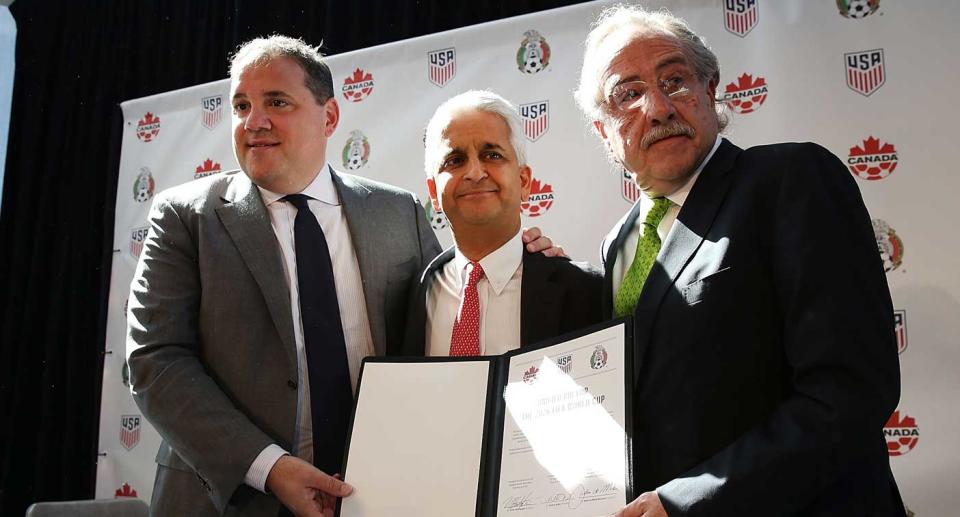Joint U.S.-Mexican-Canadian bid for 2026 World Cup could be fast-tracked Thursday

If FIFA’s members approve a fast-tracking proposal on Thursday, the United States, Mexico and Canada could all but clinch the 2026 World Cup they recently announced their joint bid for, ESPN reports.
Following the debacles of the bids for the 2018 and 2022 World Cups, which were engulfed in a tidal wave of corruption allegations as Russia and Qatar surprisingly beat out England and the United States, respectively, the bidding process was reformed. It was spread out from a group of two dozen voters to more than two hundred, while the inspection and voting processes were made more transparent and formal.
[ Follow FC Yahoo on social media: Twitter | Facebook | Tumblr ]
But it appears that in the next edition of the tournament to be assigned, those measures will be circumvented to square away the issue several years earlier than planned.
A final vote wasn’t initially due until May 2020. But we could now have one as early as June 2018, according to ESPN. And the matter could be informally resolved on Thursday. Since teaming up, the U.S., Mexico and Canada – in a 60-10-10 split of the 80 games, with all matches from the quarterfinals onward held on American soil – have pushed to accelerate the process.
Possibly because there are no other serious bidders. Europe and Asia are ineligible, because they will have the next two tournaments, while South America reportedly supports the North American bid. In Africa, only Morocco has been named as a potential host, but hasn’t formally submitted a bid yet – although one isn’t due until December of next year.
The CONCACAF contingent seemingly hopes to head off any challenge by sealing the deal now, in spite of the new process. It now proposes that it be awarded the tournament conditionally, meaning it merely has to satisfy the requirement for infrastructure – stadiums, hotels and transportation – and government support by March of next year. If it does so, FIFA could approve its hosting rights in June of next year.
Should this proposal fail at this week’s FIFA Congress in Bahrain, the bidding process will proceed as planned, with the North American triple-bid still the only official entrant.
If it succeeds, it would be a coup for the U.S., heading off shenanigans like those in 2010 for the 2022 edition at the pass. U.S. Soccer has been pragmatic in this process, seemingly including its neighboring countries in part to rule them out as rivals.
The American bid was going to be a favorite no matter who went up against it, courtesy of a unique abundance of stadiums and training facilities to handle a newly-expanded, 48-team tournament. But weird things happen at FIFA, and the mood could change from pragmatic to expansionist from one congress to the next.
Then again, the U.S. has pushed FIFA to become more transparent and fair. And basically preventing an actual bidding process from taking place isn’t exactly that. But the shortcut and power move – don’t forget it was U.S. Soccer that brokered the new FIFA presidency of Gianni Infantino – could well land the second World Cup stateside, and the first since 1994.
And the ends apparently justify the murky means.
[ESPN]
Leander Schaerlaeckens is a Yahoo Sports soccer columnist. Follow him on Twitter @LeanderAlphabet.
More from FC Yahoo:
• Chelsea moves within a win of Premier League title after crushing Middlesbrough 3-0
• The biggest underachievers and overachievers of the 2016-17 European league seasons
• Arsene Wenger finally beats Jose Mourinho as Arsenal sneaks up on Man United’s fifth place
• L.A. Galaxy problems go much deeper than disappointing Dos Santos


